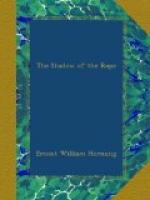It was 3.45 on the Monday afternoon when he alighted at King’s Cross, having caught the 9.30 from Northborough after an early adieu to William Allen Richardson and the rest. Langholm made sure of the time before getting into his hansom at the terminus.
“Drive hard,” he said, “to the Capital and Counties Bank in Oxford Street.”
And he was there some minutes before the hour.
“I want to know my exact balance, if it is not too much trouble to look it up before you close.”
A slip of paper was soon put into Langholm’s hand, and at a glance he flushed to the hat with pleasure and surprise, and so regained his cab. “The Cadogan Hotel, in Sloane Street,” he cried through the trap; “and there’s no hurry, you can go your own pace.”
Nor was there any further anxiety in Langholm’s heart. His balance was a clear hundred more than he had expected to find it, and his whole soul sang the praises of a country life. Unbusinesslike and unmethodical as he was, in everything but the preparation of MS., such a discovery could never have been made in town, where Langholm’s expenditure had marched arm-in-arm with his modest earnings.
“And it can again,” he said recklessly to himself, as he decided on the best hotel in the field of his investigations, instead of lodgings; “thank God, I have enough to run this racket till the end of the year at least! If I can’t strike the trail by then—”
He lapsed into dear reminiscence and dearer daydreams, their common scene some two hundred miles north; but to realize his lapse was to recover from it promptly. Langholm glanced at himself in the little mirror. His was an honest face, and it was an honest part that he must play, or none at all. He leaned over the apron and interested himself in the London life that was so familiar to him still. It was as though he had not been absent above a day, yet his perceptions were sharpened by his very absence of so many weeks. The wood pavement gave off a strong but not unpleasant scent in the heavy August heat; it was positively dear to the old Londoner’s nostrils. The further he drove upon his southwesterly course, the emptier were the well-known thoroughfares. St. James’s Street might have been closed to traffic; the clubs in Pall Mall were mostly shut. On the footways strolled the folk whom one only sees there in August and September, the entire families from the country, the less affluent American, guide book in




